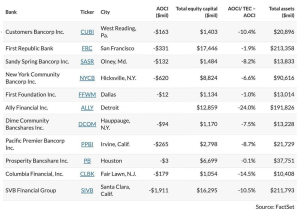As of Thursday morning, March 9, a person familiar with the situation reported that the Peter Thiel Founders Fund had no funds left in Silicon Valley Bank due to the bank’s volatile condition. The source also said that the Founders Fund withdrew millions from SVB and, following other venture capital funds, restricted access to the bankrupt financial institution.
In addition, Founders Fund advised its portfolio companies to move their funds out of SVB, although the risk was minimal.The venture capital firm has also taken other steps to distance itself from SVB, such as initiating a capital request, a common practice in the venture capital world where investors are asked to send money to invest in startups.
Founders Fund previously required its limited partners to transfer funds to SVB accounts, but it has moved to do so elsewhere as the bank’s situation has worsened.
As per the source, the firm discovered that its limited partners were facing problems while attempting to transfer funds through SVB, as they were not going through instantly as anticipated.
Subsequently, Founders Fund promptly requested its investors to transfer the funds to different banks to avoid further complications. The fund acted with urgency to prevent any delays in startup funding deals that were scheduled to be completed in the following days.
It remains unclear whether Founders Fund’s cash withdrawals from Silicon Valley Bank took place on Thursday, during the period of widespread concern about the institution’s financial status, or earlier, as stated by the anonymous source. However, it can be confirmed that Founders Fund currently has no exposure to SVB.
Unlike several other venture firms that retained some funds with SVB to sustain their relationship with the bank, Founders Fund went beyond and withdrew all its cash. Amid the bank run, which amplified the panic within the tech industry, some venture firms proposed that there was a moral obligation for the industry not to abandon SVB.
One of top banks fails
On March 10th, regulators moved swiftly to take control of the assets of one of Silicon Valley’s leading banks, marking the biggest failure of a financial institution in the US since the peak of the financial crisis nearly 15 years ago.
Silicon Valley Bank, ranked 16th in the nation, collapsed after account holders rushed to withdraw funds in the same week due to concerns about the bank’s financial stability. This marks the second-largest bank failure in the history of the United States after the fall of Washington Mutual in 2008.
The bank mainly catered to technology professionals and venture capital-funded businesses, including some of the most recognizable brands in the industry.
As per the bank’s website, nearly 50% of the technology and healthcare companies that received early funding from venture capital firms and went public last year were customers of Silicon Valley Bank. In addition, the bank prided itself on its relationships with leading tech firms such as Shopify, ZipRecruiter, and one of the top venture capital firms, Andreessen Horowitz.
The possibility of the chaos at Silicon Valley Bank extending to the wider banking industry was seen as unlikely. The larger banks, which have the potential to cause an economic crisis, have sound financials and sufficient capital.
Roku, the internet TV provider, was one of the companies affected by the collapse of Silicon Valley Bank. In a regulatory filing on Friday, Roku disclosed that approximately 26% of its cash, or $487 million, was deposited at SVB. However, the company also stated that its deposits with the bank were largely uninsured and it was uncertain how much it would be able to recover.
As part of the seizure of SVB’s assets, California bank regulators and the FDIC transferred the bank’s assets to a newly created institution called the Deposit Insurance Bank of Santa Clara. The new bank will start paying out insured deposits on Monday, and the FDIC and California regulators plan to sell off the rest of the assets to make other depositors whole.
There was unease in the banking sector throughout the week, with shares tumbling by double digits. The distress of Silicon Valley Bank on Friday resulted in a decline in shares of nearly all financial institutions.The bank’s failure was swift, with some industry analysts suggesting on Friday that the bank was still a good company and a wise investment.
However, Silicon Valley Bank executives were trying to raise capital and find additional investors while trading in the bank’s shares was halted before the stock market’s opening bell due to extreme volatility.
The FDIC took the decision to close Silicon Valley Bank shortly before noon, which is an unusual approach as the typical protocol is to wait until the end of the business day. This decision indicates how rapidly depositors withdrew their funds. However, the FDIC couldn’t find a buyer for the bank’s assets immediately.
The White House announced that Treasury Secretary Janet Yellen is closely monitoring the situation, and the administration is working to alleviate concerns and reassure the public that the overall banking system is in a healthier state than it was during the Great Recession.
PS:
Another 20 US banks are suffering huge potential losses on securities, at least 10 of them are bankruptcy applicants.
Marketwatch




